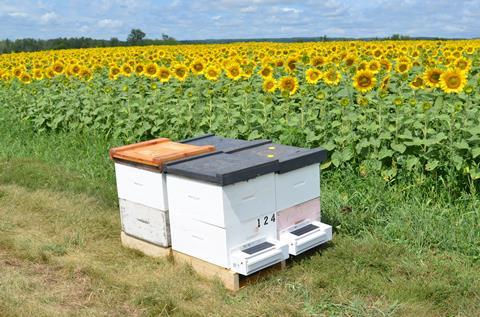Governments, farmers, consumers and agtech start-ups all have a role to play in reversing the loss of honeybee colonies
Friday 20 May is World Bee Day, a United Nations initiative to make people, governments and farmers aware of the importance of these insects for humanity and food supply.

According to the UN, nearly 90 per cent of the world’s flowering plants, 75 per cent of food crops and 35 per cent of the world’s agricultural land depend, to some extent, on pollination.
But honeybee colonies are being lost at an unprecedented rate globally, putting the future of global food supply in jeopardy.
Fortunately, everyone can play a role in protecting these pollinators. The UN has come up a series of recommendations for governments, farmers and consumers to protect these pollinators.
For governments and those responsible for policy development, it recommends promoting the participation, knowledge exchange and empowerment of rural and indigenous peoples, as well as introducing economic incentives to promote positive change.
Farmers are being asked to reserve areas as natural habitat, create plant barriers, reduce or modify the use of pesticides, respect nesting sites and plant attractive crops around the field.
Consumers can play their part by buying unrefined honey and other sustainably sourced agricultural products.
The threat to bees has also sparked a wave of innovation from agtech start-ups, who have developed a range of hi-tech solutions to boost dwindlings bee population.
Creating hi-tech homes for bees
Israeli startup Beewise has developed Beehome, a newly designed beehive that includes precision robotics, computer vision and AI to enable constant monitoring of the bees.
CEO and co-founder Saar Safra said the hi-tech homes significantly increase pollination capacity and honey production by detecting threats to a honeybee colony such as pesticides and the presence of pests and immediately defending against them.
“We’re losing honeybee colonies at an unprecedented rate globally. Just 40 years ago, the annual colony loss rate was a mere 3 per cent. Today, it’s more than 35 per cent,” Safra told Forbes.
“When this rate surpasses 50 per cent, the world will be unable to sustain the bee population.”
New bee delivery tech helps strawberries fight botrytis
Canadian company Bee Vectoring Technology (BVT) has come up with an innovative bee delivery system that builds up the natural immunity of plants to various fungal diseases, including Botrytis.
It uses commercially reared bumblebees to deliver a beneficial fungus that boosts the plants immune system, increasing its resilience to botrytis.
A tiny amount of active ingredient is delivered directly to the flowers of strawberries while they are being pollinated by the bumblebees, which protects them from infection.
CEO Ashish Malik said: “Bee Vectoring is an innovative all-natural system which helps produce a better berry crop – including higher yields, and better shelf life – all without the use of chemicals.
“The application of the plant protection product using bees does not use water, and does not require heavy machinery, so no fossil fuels are used either. It is a breakthrough, environmental system which is giving excellent results.”
Mexican avocado industry steps up to the mark
As part of its commitment to the UN’s Sustainable Development Goals, the Association of Avocado Producers and Packers of Mexico (APEAM) said it is carrying out a range of actions to protect bees.
The association, which represents more than 30,000 avocado producers and 37 exporters, said studies show that bees perform better when a balance between plants, weeds and the crop is maintained – when the avocado plants turn green and bloom, the bees migrate towards them and pollinate them.
For this reason, APEAM participates in the Maximum Pesticide Residue Limits (MRL) programme, through which it has drawn up a list of authorised pesticides that are less harmful to the environment and have no harmful effects on consumers.
Likewise, in its members’ orchards, good agricultural practices are being implemented more and more, which increase the conservation and multiplication of weed plants and, as a result, the increase in pollinators.
Carrefour invests in new bee habitats
In Italy, meanwhile, Carrefour Italia has teamed up with agritech startup 3Bee to plant three nectar-generating woodland areas in Piedmont, Emilia Romagna, and Lazio.
The areas will provide a natural habitat for bees and other plant pollinators, as well as enhancing the regions’ overall biodiversity, the retailer said.



